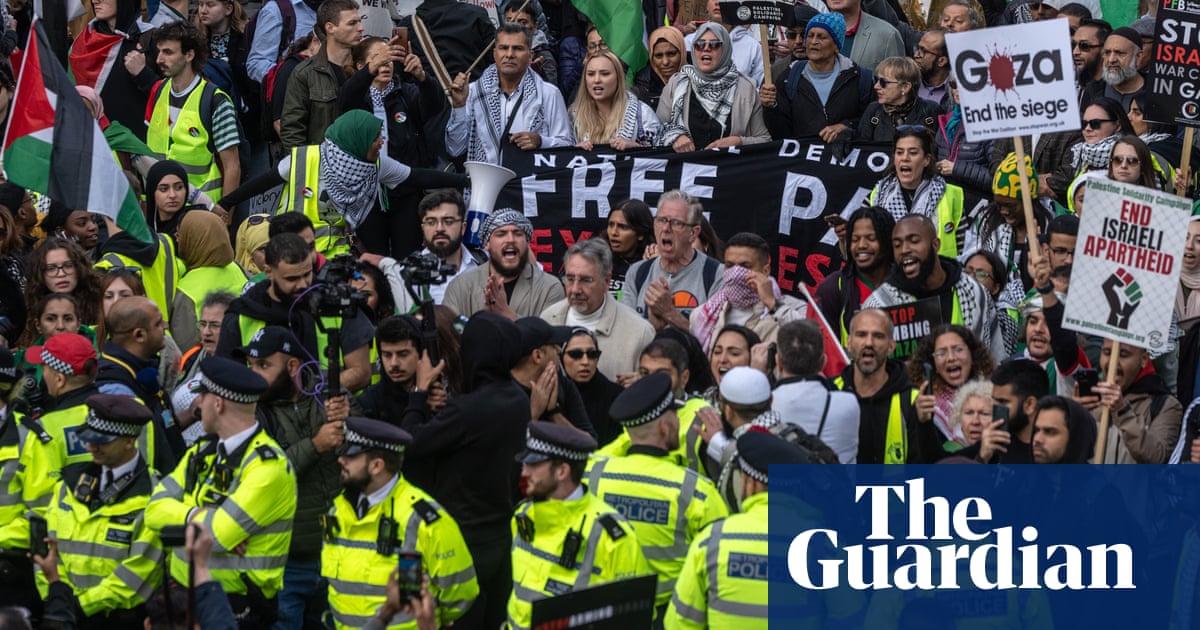Mass protests in London put other police priorities at risk, MPs warn | Police


Frequent and disruptive mass protests in central London are a drain on police resources and are putting other policing priorities at risk, an influential committee of MPs has claimed.
In comments that have concerned defenders of civil liberties, the home affairs select committee said the size and frequency of protests over the conflict in Gaza have placed significant pressures on police resources as the Metropolitan police attempt to implement a “culture change” and train thousands of new officers.
The committee proposed that the government should consider expanding the requirements for protest organisers, such as increasing the minimum notice period of six days, to enable the police to better prepare.
The suggestion, which comes after a new law was introduced making it easier for the police to put conditions on peaceful protests, has drawn staunch defences of the right to demonstrate.
Tom Southerden, Amnesty International UK’s law and human rights director, said: “There has been a major crackdown on the right to peaceful protest in this country, and yet more laws to curb protests and activism are being proposed.
“As it stands, the problem with protest in this country is not that there’s too much of it, but that the government has handed ever more sweeping powers to police to curtail it.”
Ruth Ehrlich, head of policy and campaigns at Liberty, said: “Protest is not a burden on society or public bodies – it is one of the most fundamental parts of our democracy and one we must proudly protect.”
In a report released on Tuesday, the committee noted that the successive and large-scale nature of the Israel-Gaza protests, as well as organisations such as Just Stop Oil using disruptive tactics, had presented new challenges for the police.
The extra demands come as the Met is “attempting to carry out a massive and necessary culture change exercise, at the same time as it is failing to recruit its full allocation of new officers as part of the police uplift programme”, the report said.
Should the Israel-Gaza protests continue indefinitely, police would be less able to carry out the everyday neighbourhood and response policing, MPs said.
“If the protests continue to take place as frequently at this scale, the Home Office should consider amending requirements for protest organisers, such as increasing the notice period for protest organisers to inform the police from the current six days, to allow the police to prepare better,” the report said.
Senior police officers told the committee that the wellbeing of officers was being put at risk, with more than 4,000 rest days cancelled in a three-month period to ensure protests could be policed safely.
after newsletter promotion
MPs called for police forces to be given greater support, with a comprehensive workforce plan put in place to identify and respond to demand on resources nationwide.
The committee also noted that the government’s hate crime action plan expired in 2020 and has not yet been updated. “Urgent action needs to be taken to set out the government’s strategy for dealing with hate crime,” the report said.
The committee also noted that there had been Israel-Gaza demonstrations outside MPs’ homes and offices. “In a democratic society, elected representatives must be able to do their job in accordance with their conscience and free from intimidation,” the report said.
Diana Johnson, the chair of the committee, said: “The hard-won right to protest is a vital part of our democratic process and must be protected. So must the right for everyone to feel safe on our streets, at their workplace or private home – including elected representatives, their staff and families.
“It is clear that the current demands on [police] resourcing and the level of complexity in policing protests are unsustainable without proper reinforcement. It is vital that the right framework is in place to ensure that protests can continue without the burden on policing becoming intolerable and without regularly taking resources away from communities that have their own local crime-fighting challenges.”
Source link




